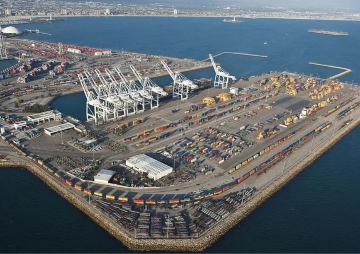With the government declaring May 10 as the polling date for Provincial Council elections in the east, LTTE is worried about the outcome of the possibly "rigged" elections. The group has asked its parliamentary proxy, Tamil National Alliance (TNA) to boycott the elections fearing a total rout in the predominantly Tamil majority area. On the other hand, the group has softened its stand on talking to the Rajapaksa government.

Sri Lanka
< class="maroontitle">Ethnic Conflict and International Community
With the government declaring May 10 as the polling date for Provincial Council elections in the east, LTTE is worried about the outcome of the possibly “rigged” elections. The group has asked its parliamentary proxy, Tamil National Alliance (TNA) to boycott the elections fearing a total rout in the predominantly Tamil majority area. On the other hand, the group has softened its stand on talking to the Rajapaksa government. Independent sources confirmed that war in the northern front had taken its toll on the group; their supply lines remain cut off and food shortages have become acute with no replenishments in sight. The government has also shut down the transmission of the group’s new television channel from Milan, Italy. Yet, news is that LTTE leader Prabhakaran is looking for a Kosovo-type solution of their problem with an active international intervention even as the government has left no stone unturned to isolate LTTE. Colombo has rejected the demands of some EU delegates to visit Wanni to meet the LTTE leadership to work out the resumption of dialogue, humanitarian access to displaced Tamils and monitor human rights situation.
The Rajapaksa government’s objective is to project Tamil Makkal Viduthalaip Puligal (TMVP) as the legitimate representative of Tamils in Sri Lanka in front of the International community. The global community seemed inclined to favour the government as the US recently donated some anti-terror equipment to “sustain and enhance the critical capabilities of the security forces of Sri Lanka in their efforts to fight terrorism.” The talks with Russia to procure five MiG-29 fighter aircrafts, following the emergence of the air division of the LTTE, were also in its final stages.
Bangladesh
< class="maroontitle">Judicial reformation?
Continuing with it programme of reforming institutions in Bangladesh, the present caretaker government last week promulgated an ordinance for the formation of the Supreme Judicial Commission for appointing apex court judges. The commission will have nine members and headed by the Chief Justice. The commission is expected to recommend two names against each vacancy to the President. The ordinance also laid down specific criteria for the selection of candidates with special emphasis on academic qualification, professional aptitude, goodwill and honesty. The government’s primary objective is to bring about professionalism in judiciary, freeing it from party politics and corruption. Another significant measure is the proposed National Constitutional Council which will be responsible for constitutional appointments like that of Chief Election commissioners, election commissioners, chairmen and members of anti corruption commission and Public service Commission. But there are serious doubts about the government’s intentions. On March 17, for instance, a High Court Judge Shah Abu Nayeem Mominur Rahman, known for his non-partisan judgements on key cases involving the government, was divested of his writ power. The judge had declared Awami League president Sheikh Hasina’s detention on corruption charges illegal. Several such decisions by the high courts have been overturned by the Supreme Court.
The government has also not changed its attitude towards the two ladies—a a new corruption case was slapped on Khaleda Zia while a court ordered proceedings to resume in a corruption case against Sheikh Hasina.
Source: New Age(Tuesday, March 18, 2008)/ New Age(Monday, March 17, 2008) / The Independent (Wednesday, March 19, 2008)/The New Nation (Sunday March 16 2008)/The News Today(Monday March 17)
Nepal
< class="maroontitle">Escalation in Political Violence
The run up to the assembly election is fraught with violence. Several incidents of violence were reported across the country. The Communist Party of Nepal-Maoists cadres assaulted rival party members. On March 17, Maoist cadres attacked a group of Communist Party of Nepal-Unified Marxist Leninist (UML) activists in Birendranagar Village Development Committee (VDC) in Chitwan District. In a separate incident, unidentified assailants shot a People's Front Nepal election candidate Kamal Prasad Adkiari in Banke Constituency No 2, on March 18. Similarly, two Maoist cadres were shot in Rolpa district the same day. It’s not only the Maoists who are indulging in violence, other parties too are equally involved. Though the Election Commission expressed concern over the violent incidents, none of the political parties are adhering to the code of conduct which has apprehensions of more violence in the days to come.
Maldives
< class="maroontitle">Slowing down of Reforms
Maldives came under international scrutiny when it was criticized by the visiting European Commission delegates for moving slow on the reforms process even as the reforms were nearing completion. The Constitution remained stuck following the deadlock over the chapter on transitional arrangements. The independent commissions were yet to be in place and the election commission continued to be headed by a Presidential appointee K.D. Ahmed Manik who was earlier accused of vote-rigging during the August referendum. Setting up of an independent Election Commission at least three months before the multi-party elections was an essential pre-requisite for conducting free and fair polls. The doubts are also cast over the impartiality and feasibility of the Civil Services Commission. The main Opposition Maldivian Democratic Party (MDP) has decided to boycott the elections if the current proposed amendments to the Civil Services Commission were implemented.
Pakistan
< class="maroontitle">Finally, PPP chooses a new PM
Ending a month-long suspense, Pakistan People’s Party (PPP) finally found a candidate for taking over the coalition leadership, and the government, as Pakistan’s new Prime Minister. The man selected—Yusuf Raza Gillani---is a staunch Bhutto loyalist and from a feudal family in Punjab with considerable following and admiration within the province. Gillani is also acceptable to the main coalition partner, Pakistan Muslim League-N (PMLN) and its leader Nawaz Sharif. Sharif had reservations about Makhdoom Amin Fahim’s candidature for his alleged proximity to President Pervez Musharraf. Gillani has been an active member of Pakistan Muslim League-Pagara group before he joined Benazir Bhutto’s PPP and worked his way to her inner coterie of advisors. Gillani has been National Assembly Speaker during Bhutto’s premiership and worked to keep Nawaz Sharif, ironically, at bay. Gillani should also be acceptable to the Punjabi Army Chief, Ashfaq Kiyani. Although Asif Ali Zardari’s move to anoint Gillani as the premier is to sideline Fahim and keep the option open of his eventual takeover in the near future, Gillani is likely to prove that he is no Yes Man.
< class="maroontitle">Contributors:
- Anjali Sharma – Sri Lanka, Maldives
- Joyeeta Bhattacharjee – Bangladesh
- Paul Soren – Nepal, Bhutan
- Wilson John – Pakistan
The views expressed above belong to the author(s). ORF research and analyses now available on Telegram! Click here to access our curated content — blogs, longforms and interviews.




 PREV
PREV

